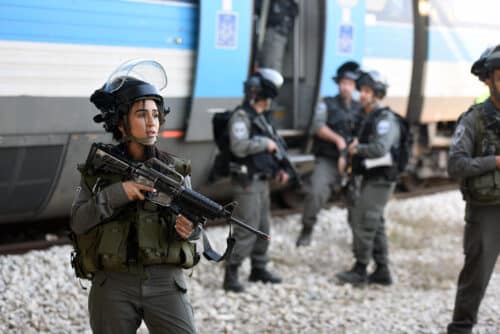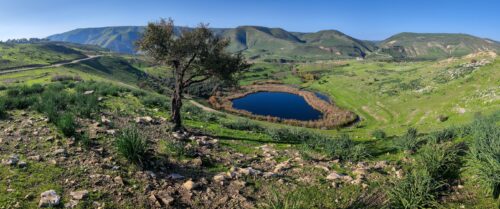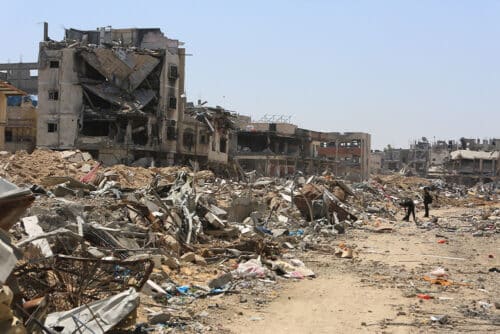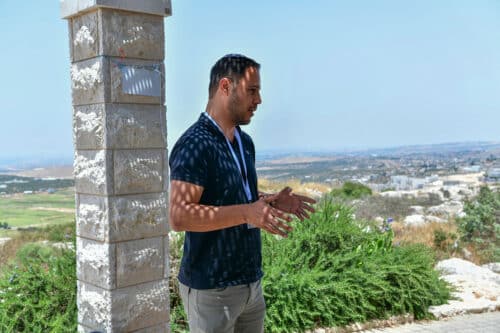On October 8, 1990, during the holiday of Sukkot, the Plaza of the Western Wall and the area of the Temple Mount became a war zone. In the events that would eventually be called the “Temple Mount Riots”, which culminated in the Israeli police being forced to retake control of the police station and the Plaza of Mosques on the Temple Mount, over 200 citizens and 20 border policemen (Magav) were injured, and 17 Arabs were killed. The senior field commander was police Major General Shlomi Katbi, who was the only person to receive commendations for his performance in the field.
We sat down with Shlomi Katbi, who is now retired police Major General, to ask him a few questions about the friction between Arab and Jewish citizens in mixed cities, both then and now.
“There were moments when I was alone, facing an angry mob”
Shalom (Shlomi) Katbi, now 67 years old, is a member of the Israel Defense and Security Forum (IDSF), a retired Major General in the Israeli Police who served in a wide variety of command positions in the police and Magav, including the commander of the Samaria Region and the commander of the Judea and Samaria District. As stated, we would like to go back for a moment to 1990 and the Temple Mount Riots.
Shlomi, take us back to October 8, 1990 – what exactly was your position at the time?
“I was the commander of the Old City and commanded 240 fighters. The event began with the traditional priestly blessing of the Sukkot holiday, when there were 20,000 Jews in the Western Wall Plaza. Around 6:00 AM thousands of Arabs began to arrive at the Temple Mount Plaza, and I warned my superiors and prepared accordingly. We tried calming the situation while simultaneously evacuating the Jews from the Western Wall Plaza. At some stage, the Arabs started storming the Western Wall Plaza with stones and fighting implements. My fighters and I blocked them, and at some stage I found myself alone facing an angry mob and confronting them on my own.
I hear this description and see how the police conducted itself in the May 2021 Riots. Where is the determination?
When I arrived on the streets of Lod during the May 2021 Riots, and I saw the people with knitted yarmulkes and members of the HaShomer HaChadash organization managing the war rooms and dividing the volunteering citizens into ready squads to patrol the city streets, I understood that the police isn’t there in full force and that the state left a vacuum in Lod. The police acted in a very limited fashion, something the Arab residents of the city did not miss – they understood that there was no governmental response and acted accordingly. You could say that the Arabs attack because they know the state will not react.
Why did this happen to the police in the May 2021 Riots, where was the mistake?
I will split my answer into two parts: Lack of backing from within and lack of backing from without. The police cannot act without outside backing. In other words, without legal moral and social backing – the police’s work is worth nothing, and the absence of this backing was felt. Support from within is likewise lacking: it is unacceptable that every policeman who operates within a hostile population is required by law to undergo a very humiliating procedure before Internal Affairs. It ties the policemen’s hands. It is necessary that the entire command structure back the policeman in the field on every issue and operational incident.
“The police stations are weak and cannot deal with events like those we saw in May”
The people who were in the field describe a dramatic change for the better in the performance of the forces, when Magav got involved. As someone who is well acquainted with Magav – why was this the case?
You must understand that the police’s routine operations are a weak routine, in other words police stations conduct a daily routine that is suited to civilian urban crime. When the riots began in the mixed cities, this was already an event on an entirely different scale, and the police stations were not strong enough to go in at the initial stage of the riots and aggressively change the balance of forces. Carrying out something like that requires operational flexibility. In other words, to react quickly and firmly to events – and that is something the police does not have and Magav does.
Is it only the weak routine, or is this related to the lack of governability?
It is certainly related. The Arab cities have no governance and when the police are not present in these cities – weapons are sold on the streets like tomatoes. Do you know where these weapons come from? These weapons are not coming from countries such as Jordan and Egypt, it comes from the IDF. Yes, from the IDF: the bases are not securing their weapons and the Bedouin can infiltrate the bases unhindered and take the weapons that are later sold to anyone who wants it and who is willing to pay a high price.
What solutions can be formulated in preparation for the next round in the mixed cities?
As I said, the police stations are weak and conduct a daily routine that is unable to deal with events such as those we witnessed in May. This inability also stems from the fact that the police budget is lacking and is not accordingly invested in building operational capabilities. In my opinion, we require a reorganization of the budget and of the police stations, the construction of operational templates, operational capabilities to be more flexible thus allowing the police stations to deal with events in real time, as we saw in the mixed cities.
Can the model in Lod, which has a type of Civil Guard, work similarly to the “National Guard” in the United States?
While it is true that we saw in Lod civil war rooms operating in the field, is a National Guard the solution? In my opinion, this is an insufficient solution, and certainly not a game changing solution.
What is the right thing to do?
At present, our national leadership, the government, is weak. One hand makes decisions that are intended to ensure industrial peace, while the other hand checks what The Hague has to say and waits for the reaction in the international arena. The government needs to stop being afraid of the big wide world. Rather, it needs to demonstrate greater governance, and that the political system has the tools to demonstrate governance. Unfortunately, the current government is a salsa dancer: it takes a step forward, but then one back, and then to the sides – all in accordance with what is said in the media. One thing is certain: in the long term, the entire country pays the price.
“To say that the tensions derive from a socioeconomic background is simply a bald-faced lie”
There are those who claim that the tensions that erupted in the May Riots was not nationalistically motivated but rather socio economically motivated. What do you think?
To say that the tensions derive from a socioeconomic background is simply a bald-faced lie. “Socioeconomic Background” – what are you talking about? Go to the universities, go to the pharmacies, go to the private sector – In all key indices the Arabs are better off statistically than any other ethnic group. Most of the Arab population maintains a high standard of living. So there are unemployed Arabs – So what? There are unemployed Jews in Lod as well, do they go out and riot?
“There is no such thing as a peace treaty with a partner that educates its children with anti-Jewish education”
There is a claim whereby what is happening in the mixed cities is actually the result of Israeli control over Judea and Samaria. What do you think?
Judea and Samaria are the land of our ancestors. The heart of the nation, in more ways than one. The people we read about in the Bible walked up on the land of Judea and Samaria. Add to that the strategic and security reasons. Judea and Samaria are the flak jacket of the State of Israel, the safety belt of Kfar Saba and Tel Aviv. I say this unequivocally: whoever abandons Judea and Samaria, endangers Jewish existence in the Land of Israel.
And what about a peace agreement?
There is no agreement with the Palestinians that can exist. There is no such thing as a peace treaty with a partner that educates its children with anti-Jewish education. It does not matter whether we give back land and how much we give back. There are politicians who wave around agreements and plans that supposedly will lead to peace with the Arabs. It reminds me of Chamberlain waving around a document he signed with Hitler after the Munich Conference.
So, what is the solution on the issue of Judea and Samaria: applying sovereignty?
Yes. We need to stop being afraid and to apply full Jewish sovereignty throughout the entire State of Israel. That is one of the fundamental principles of the IDSF. I will even do you one better: even Israeli Arabs understand deep down that this would lead to an improvement in conditions for them – since the alternative is the ISIS regime. Want proof? The fact is they join the police and the army – they want to integrate. Do you know that in the past, Arabs who served in the police would take off their uniforms before entering their villages? But not today. Now they enter their villages with pride.






